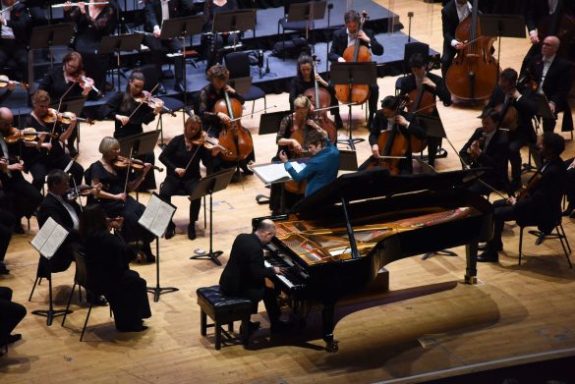 United Kingdom Clyne, Rachmaninov, Dvořák: Nelson Goerner (piano), Royal Scottish National Orchestra, Anja Bihlmaier (conductor), Usher Hall, Edinburgh, 10.11.2023. (SRT)
United Kingdom Clyne, Rachmaninov, Dvořák: Nelson Goerner (piano), Royal Scottish National Orchestra, Anja Bihlmaier (conductor), Usher Hall, Edinburgh, 10.11.2023. (SRT)

Anna Clyne – Stride
Rachmaninov – Piano Concerto No.2
Dvořák – Symphony No.8
The last time I heard Dvořák’s Eighth Symphony I was lounging on a beanbag, wedged between the cello and first violins of the Budapest Festival Orchestra. That was part of their 2023 Edinburgh International Festival residency with Iván Fischer, where the audience was invited to sit amidst the orchestra and hear the symphony from their perspective, so that many elements of the blend were lost but new colours could emerge from surprising places.
Compared to that, this Royal Scottish National Orchestra performance was rather more conventional, but that doesn’t mean it wasn’t exciting. In fact, as conducted by Anja Bihlmaier it sounded terrifically buoyant, with a first movement that balanced the solemn with the light-hearted, and a gorgeous slow movement where luxurious strings met incisive winds. The middle of the third movement had all the propulsive thrust of a Mahlerian Ländler, and the finale had an attractive touch of the peasant stomp to it.
This was German conductor Bihlmaier’s RSNO debut, and she seemed to have struck up a pretty impressive rapport with the musicians. They certainly played beautifully for her, and the strings were sensational in Anna Clyne’s Stride, her affectionate tribute to Beethoven’s Pathétique Piano Sonata. It is a fun piece to listen to if you know the Beethovenian inspiration, as Clyne disassembles and reconfigures parts of the sonata before your ears. Slowing down the sonata’s final rondo theme was a particularly clever touch, giving it the air of a louche waltz. Stride is very much its own piece, though, its harmonies warm and inviting yet somehow uncanny, as though Clyne was serving up a dish of Beethoven mashed into Tchaikovsky but very much of her own creation.
The strings which created such resonant beauty in Stride were also the finest thing about the performance of Rachmaninov’s Second Piano Concerto, sweeping all before them in the opening movement yet dissolving into thin air at the opening of the second. I was initially a little worried that Nelson Goerner’s approach to the solo line was going to be rather too businesslike: he took the opening alarmingly brusquely, and he dispatched the first movement’s second theme in a manner that was almost cursory. However, things improved noticeably in the slow movement, which was meditative, beautiful, and even a little playful at times. He also found some lovely give-and-take with the orchestra during those passages in the finale where both seem to be groping towards the next phase. The orchestral ebb-and-flow was very convincingly handled by Bihlmaier, nowhere more so than in the preparation for the first movement’s recapitulation, and Goerner’s take on the final peroration was satisfyingly cohesive. All told, a great success.
Simon Thompson
